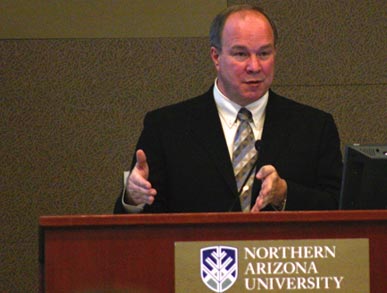We may all be living in the “biocentury” but for Arizona to claim its place in the biotech future, now is the time for action, and universities play a central role.
That was the message delivered Friday by Rick Myers, chair of the Arizona Board of Regents, at the Translational Medicine in Arizona conference being held at Northern Arizona University. His presentation, “Arizona’s Biotech Future: Collaboration is the Key” was the morning keynote during the conference’s second day.
“What are we going to do to make a better future for Arizona? We need to make the most of the resources we have to create the future we want,” Myers said.
Myers played to the theme of the conference—the ways in which medical research can best be brought to health care practice—by emphasizing the importance of making a difference in people’s lives.
“How do we translate the knowledge we create into products, and then how do we take those products and translate them properly so they can be used in society?” he asked.
A key answer, according to Myers, is to ensure that the state’s three universities step up to the challenge.
“Our universities are a major source of opportunity,” Myers said. “They have to be stronger leadership entities as we move forward, individually and collectively. They are where most of our critical mass is because there are very few companies in Arizona that have the talents and money and resources that our universities have.”
Myers tied the success of the universities to economic progress, which in turn would bring more resources to the universities.
“Our research engines at the universities really are the fundamental driver of what is going to change the future of this state,” he said. “The economic outcome that can come from the type of research we do, and the quantity of research we do and how we translate that research is absolutely critical.”
In turn, Myers recognized how critical it is for the state’s universities to produce more graduates of all types, including those with skills to drive more research and implement its outcomes.
“Translational science is not just about translating knowledge into products and practice,” he said. “It’s also about translating knowledge into people so that we can grow the research workforce that we need moving forward.”
More than just producing graduates, though, the universities must also become leaders and examples of collaboration, Myers said.
“We need the universities to be neutral ground to break down barriers,” he said. “Our institutions have to play a much stronger role in helping us get to our biotech future.”



